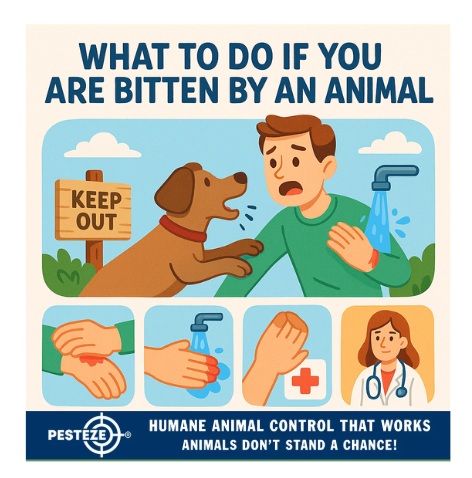WHAT TO DO IF YOU ARE BITTEN BY AN ANIMAL

WHAT TO DO IF YOU ARE BITTEN BY AN ANIMAL
SUMMARY
Animal bites can range from minor injuries to serious medical emergencies. This guide explains the steps you should take immediately after being bitten, when to seek medical attention, and how to reduce the risk of infection.
FEATURES
-
Stay calm and safe: Move away from the animal to prevent further injury.
-
Clean the wound: Wash thoroughly with soap and water.
-
Control bleeding: Apply pressure with a clean cloth if needed.
-
Apply first aid: Use antiseptic and cover the wound with a bandage.
-
Seek medical care: Professional treatment may be necessary.
-
Report the incident: Notify animal control if the bite came from a stray or wild animal.
GUIDE DESCRIPTION
Being bitten by an animal can be frightening, but quick and proper action can prevent complications. Whether the bite came from a pet, stray, or wild animal, it’s important to treat the wound carefully and determine whether further medical care is needed.
The first priority is to stay calm and safe. Remove yourself from the animal’s reach to avoid further injury. Do not attempt to chase or capture the animal if it poses a danger.
Next, clean the wound immediately. Run the bite under clean, running water for several minutes. Use mild soap to wash the area, gently scrubbing away dirt or saliva. Thorough cleaning helps remove bacteria that could cause infection.
If the wound is bleeding, control the bleeding by applying firm pressure with a clean cloth or sterile gauze. For minor bites, bleeding often stops quickly. For deeper or more severe bites, continued bleeding may require medical assistance.
After bleeding is controlled, apply first aid. Use an antiseptic solution such as hydrogen peroxide or iodine to disinfect the wound. Then, cover the area with a sterile bandage to keep it clean. Replace the dressing regularly to avoid infection.
It’s crucial to seek medical care depending on the severity and source of the bite. Any deep wounds, bites on the face or hands, or bites from wild or stray animals should be evaluated by a healthcare professional. In some cases, stitches, antibiotics, or a tetanus booster may be required.
If the animal that bit you is a stray or wild species, it’s especially important to consider the risk of rabies. Contact your doctor or local health authorities immediately if there is any chance of rabies exposure, as post-exposure vaccinations may be necessary.
Finally, report the incident to local animal control, particularly if the bite came from a stray or wild animal. Reporting helps authorities monitor for rabies and prevent further incidents. If the animal was a pet, notify its owner and confirm vaccination status.
By acting quickly, cleaning thoroughly, and seeking medical advice when needed, you can significantly reduce the risks associated with animal bites and protect your health.
- Saneeth Thota


Comments 0